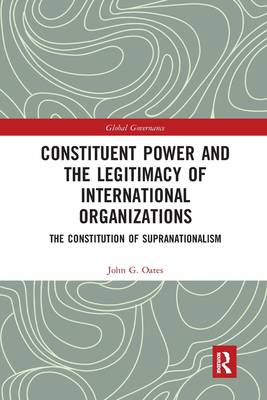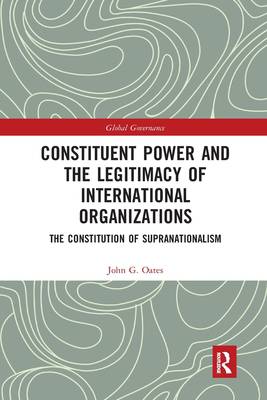
- Afhalen na 1 uur in een winkel met voorraad
- Gratis thuislevering in België vanaf € 30
- Ruim aanbod met 7 miljoen producten
- Afhalen na 1 uur in een winkel met voorraad
- Gratis thuislevering in België vanaf € 30
- Ruim aanbod met 7 miljoen producten
Constituent Power and the Legitimacy of International Organizations
The Constitution of Supranationalism
John G OatesOmschrijving
This book develops a constitutional theory of international organization to explain the legitimation of supranational organizations.
Supranational organizations play a key role in contemporary global governance, but recent events like Brexit and the threat by South Africa to withdraw from the International Criminal Court suggest that their legitimacy continues to generate contentious debates in many countries. Rethinking international organization as a constitutional problem, Oates argues that it is the representation of the constituent power of a constitutional order, that is, the collective subject in whose name authority is wielded, which explains the legitimation of supranational authority. Comparing the cases of the European Union, the World Trade Organization, and the International Criminal Court, Oates shows that the constitution of supranationalism is far from a functional response to the pressures of interdependence but a value-laden struggle to define the proper subject of global governance.
The book will be of interest to students and scholars of international organization and those working in the broader fields of global governance and general International Relations theory. It should also be of interest to international legal scholars, particularly those focused on questions related to global constitutionalism.
Specificaties
Betrokkenen
- Auteur(s):
- Uitgeverij:
Inhoud
- Aantal bladzijden:
- 196
- Taal:
- Engels
- Reeks:
Eigenschappen
- Productcode (EAN):
- 9781032337043
- Verschijningsdatum:
- 13/06/2022
- Uitvoering:
- Paperback
- Formaat:
- Trade paperback (VS)
- Afmetingen:
- 152 mm x 234 mm
- Gewicht:
- 249 g

Alleen bij Standaard Boekhandel
Beoordelingen
We publiceren alleen reviews die voldoen aan de voorwaarden voor reviews. Bekijk onze voorwaarden voor reviews.











